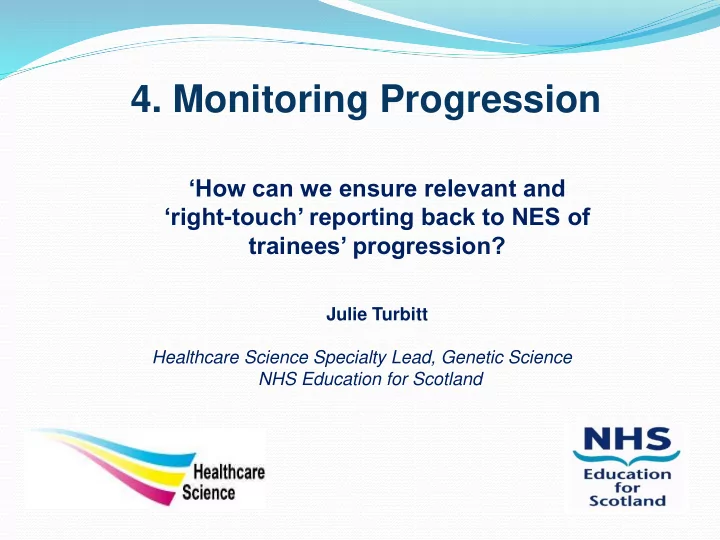

4. Monitoring Progression ‘How can we ensure relevant and ‘right - touch’ reporting back to NES of trainees’ progression? Julie Turbitt Healthcare Science Specialty Lead, Genetic Science NHS Education for Scotland
Progression Monitoring: Why and How? Why monitor trainees’ progress? Trainees become more aware of their performance Indicates if the training programme is working Ideas for improving training We do NOT KNOW ahead of time whether an intervention will be successful!
Why Monitor Progress? Governance : Training must be Quality Managed Importance of our HCS community… Improve Evaluate Review Monitor
Why Monitor Progression? “In God we trust… All others must have data.” “attributed to William E. Denning
How is training progression currently monitored by our Healthcare Science community? Is your progression documented and signed off in the workplace? 100% 75% 80% 60% 40% 25% 20% 0% YES NO 2016 Healthcare Science Postgraduate Trainee Survey [47% Response rate] • 31% of trainees do NOT have an agreed training plan “ My supervisor hasn’t allocated any time within work to review my training.” “Regular meetings to re - affirm progress would be an improvement.”
How is training progression currently monitored by our Healthcare Science community? Do trainees have an annual/mid-point review of progression? 9% 45% NO 46% PARTLY YES 2016 Healthcare Science Postgraduate Supervisor Survey [60% Response rate]
Audit of NES Healthcare Science Trainee Management? • NES management of Healthcare Science Training may be subject to auditing • In August 2016: Scott-Moncreiff performed an audit • Audit findings revealed a shaky approach to our progression monitoring! • Findings: 3.1 Monitoring Progress - Mid-point reviews undertaken for some schemes/ not all! - Risk : Trainees may not be receiving adequate support - Should establish programme of regular reviews of trainee progress
Mid way Quality Assurance The Scottish Medical Physics Training Scheme (Non-STP) Half way through training, trainees submit a portfolio A panel of 3 conduct an examination by viva One of the assessors will be an ‘expert’ in the trainees chosen specialism Also present : External Moderator / Adviser Panel decides on outcome: Satisfactory?
• Important feedback from Trainee to Training Centre
Special Measures!!!! NES Healthcare Science Postgraduate trainees Special Measures Principles A. Scope A.01 These principles outline NES Healthcare Science approach to Special Measures in cases where either trainees, supervisors or training departments cannot demonstrate satisfactory attainment or maintenance of training standards A.02 Two primary objectives of these principles are to: A.2.1 ensure patient safety , both the immediate practice placement and later likely performance of an individual whose training experience has been compromised. A.2.2 ensure progression , both for the well-being of the individual trainee and the return on investment of public funds in NHS training.
Monitoring Progress Group Discussion………. 1. How do you currently monitor trainee progression? Progression monitoring for NTN holders: - (includes Clinical Scientists, NES award holders, others admitted to NTN register) 2. How is progression monitoring documented? 3. What do you think of Mid-Point Reviews/Viva? - Timescale (Annual/mid-way/or more frequent?) - Are mid-point vivas possible in your current scheme? (Number of trainees/ Time/ Resources??)
NES Training Programme Management System - Tracking trainees, supervisors, departments, monitoring progression . Supervisor Completion Department Intake Year Division Specialty Employer Name Funding Status NTN Theme HCS Year
“TURAS” Online training tracker Database designed to chart the trainee’s journey throughout their training Incorporates training department, stage of training, rotations, special measures/events (e.g. out of programme) Will provide regulator “assurance” of Training Programme management Utilises current, NES issued, training numbers Generic architecture with HCS ‘skin’. Already used by medical, dental and pharmacy postgraduate trainees
TURAS Training Programme Management (TPM)
TURAS – HCS TPM Progress to date
TURAS – Monitoring Rotations/Specialities
Standardising HCS progress monitoring - documentation
Document- 20: ‘Notification of trainee progression’ Review of trainee progression should be harmonised across specialities! Group Discussion………. 1. Discuss and review document- 20 (NES standardised form)? 2. Draft document: Is there anything you would change/add? 3. General Comments - Ease of completion? - Start with paper copy & move to TURAS in future?
Thank you!
Further Discussion………. 1. Monitoring Progression: How do we best engage colleagues about this? 2. Should we set a “due by” date at the outset? 3. Should we produce further guidance on a good approach to progression monitoring? - If so, what would it contain?
Recommend
More recommend